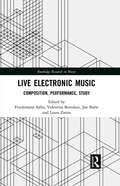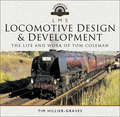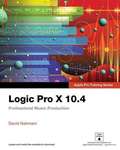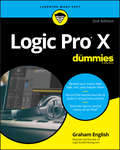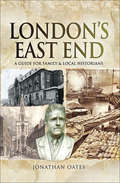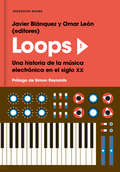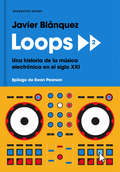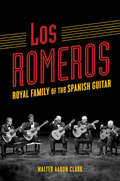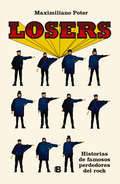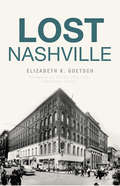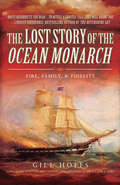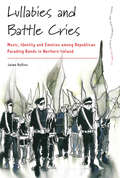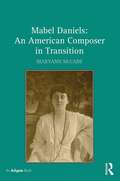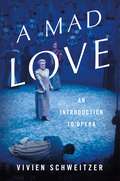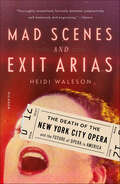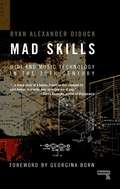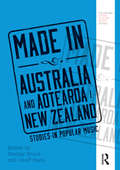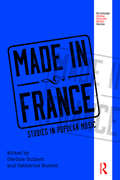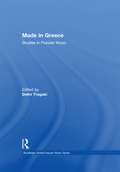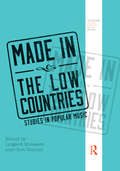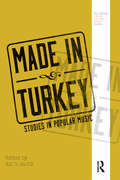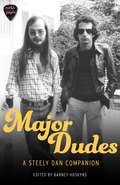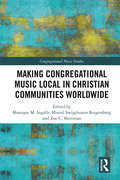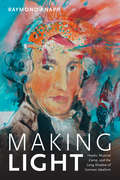- Table View
- List View
Live Electronic Music: Composition, Performance, Study (Routledge Research in Music)
by Friedemann Sallis Valentina Bertolani Jan Burle Laura ZattraDuring the twentieth century, electronic technology enabled the explosive development of new tools for the production, performance, dissemination and conservation of music. The era of the mechanical reproduction of music has, rather ironically, opened up new perspectives, which have contributed to the revitalisation of the performer’s role and the concept of music as performance. This book examines questions related to music that cannot be set in conventional notation, reporting and reflecting on current research and creative practice primarily in live electronic music. It studies compositions for which the musical text is problematic, that is, non-existent, incomplete, insufficiently precise or transmitted in a nontraditional format. Thus, at the core of this project is an absence. The objects of study lack a reliably precise graphical representation of the work as the composer or the composer/performer conceived or imagined it. How do we compose, perform and study music that cannot be set in conventional notation? The authors of this book examine this problem from the complementary perspectives of the composer, the performer, the musical assistant, the audio engineer, the computer scientist and the musicologist.
LMS Locomotive Design & Development: The Life and Work of Tom Coleman (Locomotive Portfolio Ser.)
by Tim Hillier-GravesIn 1958 one of Britain`s greatest locomotive designers died without public fanfare or recognition, mourned only by his family. Yet William Stanier, arguably one of our greatest engineers and his leader, said of him that without his Chief Draughtsman all he achieved with the LMS would not have been possible. How could such a man slip from our view and remain anonymous, although his Princess Coronations, Black 5s and 8Fs are regarded as three of the finest classes of locomotive ever built? And today many survive as stars to grace the ever growing preservation movement.In reality, Tom Coleman was an intensely private and modest man who never sought recognition or commendation. His need for privacy may be one reason why his life has remained shrouded in mystery for so long, but finally his story has been slowly pieced together from a wide variety of sources, many previously untapped. So now we can see for ourselves his great contribution to railway history and recognise his singular talents.
Logic Pro X 10. 4 - Apple Pro Training Series: Professional Music Production (Apple Pro Training)
by David NahmaniRecord, arrange, mix, produce, and polish your audio files with this best-selling, Apple-certified guide to Logic Pro X 10.4. Veteran producer and composer David Nahmani uses step-bystep, project-based instructions and straightforward explanations to teach everything from basic music creation to sophisticated production techniques. Using the book’s downloadable lesson files and Logic Pro X, you’ll begin making music in the first lesson. From there, learn to record audio and MIDI data, create and edit sequences, and master mixing and automation techniques such as submixing with track stacks. Create both acoustic and electronic virtual drum performances using Drummer tracks with Drum Kit Designer and Drum Machine Designer. Use Logic Pro X MIDI FX and Smart Controls to control software synthesizers from a MIDI controller or an iPad. Harness the power of Smart Tempo to make sure all recordings, imported audio files, and samples play in time. Flex Time allows you to precisely edit the timing of notes inside an audio recording, and you’ll explore Flex Pitch to correct the pitch of a vocal recording. Finally, you mix, automate, and master the song, using plug-ins to process only selected sections or entire tracks, giving your audio creations the final polish needed to achieve a professional sound. Downloadable lesson and media files allow you to perform the hands-on exercises. Focused lessons take you step by step through practical, real-world tasks. Accessible writing style puts an expert instructor at your side Ample illustrations help you master techniques fast. Lesson goals and time estimates help you plan your time. Chapter review questions summarize what you’ve learned and help you prepare for the Apple certification exam.
Logic Pro X For Dummies
by Graham EnglishSpend less time learning and more time recording Logic Pro X offers Mac users the tools and power they need to create recordings ready to share with the world. This book provides the know-how for navigating the interface, tweaking the settings, picking the sounds, and all the other tech tasks that get in the way of capturing the perfect take. Written by a Logic Pro X trainer who’s used the software to further his own music career, Logic Pro X For Dummies cuts back on the time needed to learn the software and allows for more time making amazing recordings. Record live sound sources or built-in virtual instruments Arrange your tracks to edit, mix, and master Discover tips to speed the process and record on an iPad Make sense of the latest software updates A favorite among Logic Pro X beginners, this book is updated to reflect the ongoing changes added to enhance Logic Pro X’s recording power.
Lola Lolita. Nunca dejes de bailar: Los sueños de una muser (Lola Lolita #Volumen 1)
by Lola Moreno¡Lola Lolita, las aventuras de la estrella de Musical·ly! Nunca dejes de bailar con @lolaloliitaaa Lola está de los nervios. Hoy empieza clases en un nuevo insti superguay que lo tiene todo... ¡menos a sus amigas! El primer día conoce a Lucia, Ana y Carla, tres chicas que parecen tener algo en común con Lola: adoran a David Peluso, un youtuber guapísimo con una voz alucinante. ¡Que coincidencia! A partir de aquí empiezan a ser superamigas y crean un club de baile para montar la coreografía estrella del festival de navidad. Pronto todos en el insti descubrirán que Lola es una superestrella de Musical·ly y vivirán muchas aventuras hasta el día de la coreo final. ¿Saldrá todo como tenían previsto?
London's East End: A Guide for Family & Local Historians
by Jonathan OatesThe East End is one of the most famous parts of London and it has had its own distinctive identity since the district was first settled in medieval times. It is best known for extremes of poverty and deprivation, for strong political and social movements, and for the extraordinary mix of immigrants who have shaped its history. Jonathan Oatess handbook is the ideal guide to its complex, rich and varied story and it is an essential source for anyone who wants to find out about an East End ancestor or carry out their own research into the area.He outlines in vivid detail the development of the neighbourhoods that constitute the East End. In a series of information-filled chapters, he explores East End industries and employment the docks, warehouses, factories, markets and shops. He looks at its historic poverty and describes how it gained a reputation for criminality, partly because of notorious criminals like Jack the Ripper and the Krays. This dark side to the history contrasts with the liveliness of the East End entertainments and the strong social bonds of the immigrants who made their home there Huguenots, Jews, Bangladeshis and many others.Throughout the book details are given of the records that researchers can consult in order to delve into the history for themselves online sites, archives, libraries, books and museums.
Loops 1: Una historia de la música electrónica en el siglo XX
by Javier Blánquez Omar MoreraVuelve la Biblia de la música electrónica. Una edición revisada y ampliada de una obra que marcó una época. El regreso más esperado por los fans de la música electrónica. <P><P>Loops es una obra pionera que marcó un antes y un después cuando se publicó en el año 2000. Ahora vuelve revisada y ampliada, fiel a ese primer estudio apasionado sobre el nacimiento y la evolución de un género único. Cubriendo todo el siglo XX, Loops trata con idéntica pasión las expresiones electrónicas más difíciles y las relacionadas con el fenómeno de la música de baile. <P><P>Sus autores trazan conexiones entusiastas con el universo del pop, el rock, el cine y la literatura para explicar el cómo y el porqué de la electrónica. Obra de una decena de periodistas, productores y DJ, éste pretende ser un libro de múltiples lecturas; una guía o introducción básica para el no iniciado, un volumen que ayuda a buscar pistas, a seleccionar escuchas en función de gustos, y a la vez un trabajo que pueda ampliar datos y conocimientos al ya iniciado o incluso al experto. Reseñas:«Uno de los intentos más serios realizados en nuestro país por ofrecer una visión panorámica sobre la música electrónica.»El País «Interesante, divertido, exhaustivo y excelentemente documentado.»Ricard Robles, codirector del Festival Sónar «Una obra imprescindible para entender la música que escuchamos.»Ángel Molina
Loops 2: Una historia de la música electrónica en el siglo XXI
by Javier BlánquezUna historia intensa y apasionada sobre el último siglo de un género musical que hipnotiza a multitudes: la música electrónica. Loops 2 retoma la historia de la música electrónica dónde la dejó el primer volumen, una obra canónica para los amantes del género. <P><P> Desde 2002 hasta la actualidad, el periodista Javier Blánquez cubre la transformación de un estilo musical que en los últimos quince años ha dejado de ser minoritario para formar parte del relato cultural del siglo XXI. <P>Todo ha evolucionado a un ritmo frenético: los hábitos de consumo han cambiado raves por festivales y clubes por teléfonos móviles, la técnica ofrece más opciones que nunca, la aparición de nuevas corrientes es constante y la electrónica ha colonizado prácticamente todos los géneros a su alrededor. <P> Esta obra nace de un trabajo meticuloso y entusiasmado que plantea un sinfín de preguntas que apelarán a aficionados y neófitos por igual: ¿es el reggaetón música electrónica? ¿Lo es el último disco de Madonna con referencias veladas al éxtasis? ¿Va por libre el hip hop? ¿Y el rock, se puede bailar? Y, en el centro del debate: ¿cuál es la verdadera identidad de este género en pleno siglo XXI? ¿Realmente lo hemos visto todo?
Los Romeros: Royal Family of the Spanish Guitar (Music in American Life)
by Walter Aaron ClarkSpanish émigré guitarist Celedonio Romero gave his American debut performance on a June evening in 1958. In the sixty years since, the Romero Family—Celedonio, his wife Angelita, sons Celín, Pepe, and Angel, as well as grandsons Celino and Lito—have become preeminent in the world of Spanish flamenco and classical guitar in the United States. Walter Aaron Clark's in-depth research and unprecedented access to his subjects have produced the consummate biography of the Romero family. Clark examines the full story of their genius for making music, from their outsider's struggle to gain respect for the Spanish guitar to the ins and outs of making a living as musicians. As he shows, their concerts and recordings, behind-the-scenes musical careers, and teaching have reshaped their instrument's very history. At the same time, the Romeros have organized festivals and encouraged leading composers to write works for guitar as part of a tireless, lifelong effort to promote the guitar and expand its repertoire. Entertaining and intimate, Los Romeros opens up the personal world and unfettered artistry of one family and its tremendous influence on American musical culture.
Losers: Historias de famosos perdedores del rock
by Maximiliano PoterMaxi Poter (re)descubre a esos músicos a los que el destino les jugó una broma pesada que los dejó en el backstage de la gloria. Los artistas que -por azar, tragedias, desencuentros, traiciones, pifies, pelotas en el palo, confusiones y tropiezos cósmicos- se quedaron viendo la consagración desde afuera. Alguna vez The Police fue un desastroso cuarteto. Los Rolling Stones eran seis, pero a uno lo echaron por "feo". En varios países, los Beatles fueron John, Paul, George y un tal "Jimmie". Kiss tuvo un guitarrista con artrosis y Led Zeppelin casi elige al cantante más desafortunado del mundo. La biografía de los más grandes íconos del rock está llena de ilustres desconocidos que, por diversas razones, se quedaron al borde de la fama y hoy son ocultas notas al pie de mitos y leyendas. Maximiliano Poter (re)descubre y (re)valoriza a los otros "Pete Best" de la historia: esos músicos que aun teniendo todo lo que hace falta (talento, carisma, atractivo, dedicación, oportunismo, contactos y hasta la imprescindible "suerte") se quedaron en el backstage de la gloria. Losers reúne las maravillosas y agridulces vidas de esos desdichados que son parte fundamental de la crónica universal del rock pero que -por azar, tragedias, peleas, traiciones, pifies, confusiones, macanas, pelotas en el palo y hasta injusticias cósmicas- no recibieron su merecida consagración. Estos son los más exitosos "casi famosos".
Lost Nashville (Lost)
by Betsy Phillips Elizabeth K. GoetschNashville is chock- full of music landmarks, but there are quite a few historic structures that have been lost to time. The elegant Maxwell House Hotel served a breakfast blend that grew into the nationally known coffee brand. Public transportation first arrived in Nashville by way of horse-pulled streetcars in the 1860s. Fort Negley was the largest stone fort built during the Civil War. The Nashville Female Academy once served as the largest school for young ladies in the United States during the nineteenth century. Author Elizabeth Goetsch digs into the archives for some of the Music City's lost structures.
The Lost Story of the Ocean Monarch: Fire, Family, & Fidelity
by Gill HoffsThe ship was almost instantly in flames Some jumped overboard immediately, and all was in indescribable confusion. The masts began to fall one after another, and it is supposed killed great numbers by their descent. Others, it is feared, were roasted alive, but the majority were drowned. (Hull Advertiser and Exchange Gazette, 25 August 1848)The Ocean Monarch was only a few hours out of Liverpool on 24 August 1848 when a cabin passenger shouted Fire! and all hell broke loose. Bound for Boston with almost 400 people on board, the emigrant ship was soon ablaze with little chance of putting the flames out. People watched helplessly from their cottages along the Welsh coast as some ships ignored the travellers plight while others raced to their aid. On the 170th anniversary of the disaster Gill Hoffs reveals the full story of this forgotten wreck, including tales of French royalty, an American artist, and a courageous stewardess who gave her life to save her fellow travellers. Discover what happened to the passengers and crew, including:James K. Fellows, a kindly American jeweller trying to get home to his familyJotham Bragdon, the first mate who fled the wreck then returned to shore a heroMary Walter and her mysterious family, escaping danger in London only to find greater peril lay at seaFollow the murder trial of a crew of rescuers and find out the real fate of their victim and whether the mysterious Irish toddler Kate found her family again.
Lullabies and Battle Cries: Music, Identity and Emotion among Republican Parading Bands in Northern Ireland (Dance and Performance Studies #13)
by Jaime RollinsSet against a volatile political landscape, Irish republican culture has struggled to maintain continuity with the past, affirm legitimacy in the present, and generate a sense of community for the future. Lullabies and Battle Cries explores the relationship between music, emotion, memory, and identity in republican parading bands, with a focus on how this music continues to be utilized in a post-conflict climate. As author Jaime Rollins shows, rebel parade music provides a foundational idiom of national and republican expression, acting as a critical medium for shaping new political identities within continually shifting dynamics of republican culture.
Mabel Daniels: An American Composer In Transition
by Maryann McCabeMabel Daniels (1877–1971): An American Composer in Transition assesses Daniels within the context of American music of the first half of the twentieth century. Daniels wrote fresh sounding works that were performed by renowned orchestras and ensembles during her lifetime but her works have only recently begun to be performed again. The book explains why works by Daniels and other women composers fell out of favor and argues for their performance today. This study of Daniels’s life and works evinces transition in women’s roles in composition, the professionalization of women composers, and the role that Daniels played in the institutionalization of American art music. Daniels’s dual role as a patron-composer is unique and expressive of her transitional status.
A Mad Love: An Introduction to Opera
by Vivien SchweitzerA lively introduction to opera, from the Renaissance to the twenty-first centuryThere are few art forms as visceral and emotional as opera-and few that are as daunting for newcomers. A Mad Love offers a spirited and indispensable tour of opera's eclectic past and present, beginning with Monteverdi's L'Orfeo in 1607, generally considered the first successful opera, through classics like Carmen and La Boheme, and spanning to Brokeback Mountain and The Death of Klinghoffer in recent years. Musician and critic Vivien Schweitzer acquaints readers with the genre's most important composers and some of its most influential performers, recounts its long-standing debates, and explains its essential terminology. Today, opera is everywhere, from the historic houses of major opera companies to movie theaters and public parks to offbeat performance spaces and our earbuds. A Mad Love is an essential book for anyone who wants to appreciate this living, evolving art form in all its richness.
Mad Scenes and Exit Arias: The Death of the New York City Opera and the Future of Opera in America
by Heidi WalesonFrom the Wall Street Journal's opera critic, a wide-ranging narrative history of how and why the New York City Opera went bankrupt—and what it means for the future of the artsIn October 2013, the arts world was rocked by the news that the New York City Opera—“the people’s opera”—had finally succumbed to financial hardship after 70 years in operation. The company had been a fixture on the national opera scene—as the populist antithesis of the grand Metropolitan Opera, a nurturing home for young American talent, and a place where new, lively ideas shook up a venerable art form. But NYCO’s demise represented more than the loss of a cherished organization: it was a harbinger of massive upheaval in the performing arts—and a warning about how cultural institutions would need to change in order to survive.Drawing on extensive research and reporting, Heidi Waleson, one of the foremost American opera critics, recounts the history of this scrappy company and reveals how, from the beginning, it precariously balanced an ambitious artistic program on fragile financial supports. Waleson also looks forward and considers some better-managed, more visionary opera companies that have taken City Opera’s lessons to heart.Above all, Mad Scenes and Exit Arias is a story of money, ego, changes in institutional identity, competing forces of populism and elitism, and the ongoing debate about the role of the arts in society. It serves as a detailed case study not only for an American arts organization, but also for the sustainability and management of nonprofit organizations across the country.
Mad Skills: MIDI and Music Technology in the Twentieth Century
by Ryan DiduckA cultural history of MIDI (the Musical Instrument Digital Interface), one of the most revolutionary and transformative technologies in the history of music.A history of electronic music that goes way beyond the Moog. Part rigorous history, part insightful commentary, and part memoir, Mad Skills tells the story behind MIDI, aka the Musical Instrument Digital Interface, through the twentieth century's kaleidoscopic lens. Guiding us across one hundred years of musical instruments, and the music made with them, Mad Skills recounts the technical and creative innovations that led to the making of the most vital, long-standing, ubiquitous, and yet invisible music technology of our time.
Made in Australia and Aotearoa/New Zealand: Studies in Popular Music (Routledge Global Popular Music Series)
by Shelley Brunt Geoff StahlMade in Australia and Aotearoa/New Zealand: Studies in Popular Music serves as a comprehensive and thorough introduction to the history, sociology, and musicology of twentieth-century popular music of Australia and Aotearoa/New Zealand. The volume consists of chapters by leading scholars of Australian and Aotearoan/New Zealand music, and covers the major figures, styles, and social contexts of pop music in Australia and Aotearoa/New Zealand. Each chapter provides adequate context so readers understand why the figure or genre under discussion is of lasting significance to Australian or Aotearoan/New Zealand popular music. The book first presents a general description of the history and background of popular music in these countries, followed by chapters that are organized into thematic sections: Place-Making and Music-Making; Rethinking the Musical Event; Musical Transformations: Decline and Renewal; and Global Sounds, Local Identity.
Made in France: Studies in Popular Music (Routledge Global Popular Music Series)
by Gérôme Guibert Catherine RudentMade in France: Studies in Popular Music serves as a comprehensive introduction to the history, sociology, and musicology of contemporary French popular music. The volume consists of essays by scholars of French popular music, and covers the major figures, styles, and social contexts of pop music in France. The book first presents a general description of the history and background of popular music in France, followed by essays that are organized into thematic sections: The Mutations of French Popular Music During the "Trente Glorieuses"; Politicising Popular Music; Assimilation, Appropriation, French Specificity; and From Digital Stakes to Cultural Heritage: French Contemporary Topics. Contributors: Christian Béthune Juliette Dalbavie Gérôme Guibert Fabien Hein Olivier Julien Marc Kaiser Barbara Lebrun David Looseley Stéphanie Molinero Anne Petiau Cécile Prévost-Thomas Vincent Rouzé Catherine Rudent Matthieu Saladin Jedediah Sklower Raphaël Suire Florence Tamagne
Made in Greece: Studies in Popular Music (Routledge Global Popular Music Series)
by Dafni TragakiMade in Greece: Studies in Popular Music serves as a comprehensive and thorough introduction to the history, sociology, and musicology of contemporary Greek popular music. Each essay covers the major figures, styles, and social contexts of pop music in Greece, first presenting a general description of the history and background of popular music in Greece, followed by essays, written by leading scholars of Greek music, that are organized into thematic sections: Hugely Popular, Art-song Trajectories, Greekness beyond Greekness, Counter Stories, and Present Musical Pasts.
Made in the Low Countries: Studies in Popular Music (Routledge Global Popular Music Series)
by Lutgard Mutsaers Gert KeunenMade in the Low Countries: Studies in Popular Music serves as a comprehensive and thorough introduction to the history, sociology, and musicology of twentieth and twenty-first century popular music of the Dutch-speaking region comprising the Netherlands and Flanders as a region of federal Belgium. The volume consists of essays by leading scholars and publicists in this field, and covers the major issues, genres, and contexts of popular music. Each essay provides adequate context so readers understand why the issue or genre under discussion is of lasting significance to this transnational region. The book first presents a general description of the history and background of popular music made in the region, followed by essays that are organized into four thematic sections: I: Framing and Facilitating; II: Creation and Curation; III: Close Encounters; IV: Changes and Choices.
Made in Turkey: Studies in Popular Music (Routledge Global Popular Music Series)
by Ali C. GedikMade in Turkey: Studies in Popular Music serves as a comprehensive and thorough introduction to the history, sociology, and musicology of Turkish popular music. The volume consists of essays by leading scholars of Turkish music, and covers the major figures, styles, and social contexts of popular music in Turkey. Each essay provides adequate context so readers understand why the figure or genre under discussion is of lasting significance to Turkish popular music. The book first presents a general description of the history and background of popular music in Turkey, followed by essays that are organized into thematic sections: Histories, Politics, Ethnicities, and Genres.
Major Dudes: A Steely Dan Companion
by Barney Hoskyns'An indispensable compendium for Steely Dan fans' The WireAt its core a creative marriage between Donald Fagen and Walter Becker, Steely Dan are one of the defining and bestselling American rock acts of the last half-century, recording several of the cleverest and best-produced albums of the '70s - from the breathlessly catchy Can't Buy a Thrill to the sleekly sinister Gaucho.In the '90s they returned to remind us of how sorely we had missed their elegance and erudition, subsequently recording Two Against Nature and Everything Must Go during the following decade. They have sold close to forty-five million albums.'A lot of people think of them as the epitome of boring '70s stuff,' novelist William Gibson said in 1993, when Becker and Fagen toured for the first time in nineteen years. 'They don't realize this is probably the most subversive material pop has ever thrown up.'Now fully embraced by the 'Yacht Rock' generation - semi-ironic devotees of '70s Southern-California slickness - Steely Dan no longer polarize lo-fi punks and studio geeks in the way they used to. In 2001 they were inducted into the Rock and Roll Hall of Fame.Major Dudes collects some of the smartest and wittiest interviews Becker and Fagen have ever given, along with insightful reviews of - and commentary on - their extraordinary songs. Compiled by Rock's Backpages editor Barney Hoskyns, the book's contributors include Charles Shaar Murray, Robert Palmer, Ian MacDonald, Bud Scoppa, Penny Valentine, Fred Schruers, Sylvie Simmons and Michael Watts.
Making Congregational Music Local in Christian Communities Worldwide (Congregational Music Studies Series)
by Monique M. Ingalls Muriel Swijghuisen Reigersberg Zoe C. SherinianWhat does it mean for music to be considered local in contemporary Christian communities, and who shapes this meaning? Through what musical processes have religious beliefs and practices once ‘foreign’ become ‘indigenous’? How does using indigenous musical practices aid in the growth of local Christian religious practices and beliefs? How are musical constructions of the local intertwined with regional, national or transnational religious influences and cosmopolitanisms? Making Congregational Music Local in Christian Communities Worldwide explores the ways that congregational music-making is integral to how communities around the world understand what it means to be ‘local’ and ‘Christian’. Showing how locality is produced, negotiated, and performed through music-making, this book draws on case studies from every continent that integrate insights from anthropology, ethnomusicology, cultural geography, mission studies, and practical theology. Four sections explore a central aspect of the production of locality through congregational music-making, addressing the role of historical trends, cultural and political power, diverging values, and translocal influences in defining what it means to be ‘local’ and ‘Christian’. This book contends that examining musical processes of localization can lead scholars to new understandings of the meaning and power of Christian belief and practice.
Making Light: Haydn, Musical Camp, and the Long Shadow of German Idealism
by Raymond KnappIn Making Light Raymond Knapp traces the musical legacy of German Idealism as it led to the declining prestige of composers such as Haydn while influencing the development of American popular music in the nineteenth century. Knapp identifies in Haydn and in early popular American musical cultures such as minstrelsy and operetta a strain of high camp—a mode of engagement that relishes both the superficial and serious aspects of an aesthetic experience—that runs antithetical to German Idealism's musical paradigms. By considering the disservice done to Haydn by German Idealism alongside the emergence of musical camp in American popular music, Knapp outlines a common ground: a humanistically based aesthetic of shared pleasure that points to ways in which camp receptive modes might rejuvenate the original appeal of Haydn's music that has mostly eluded audiences. In so doing, Knapp remaps the historiographical modes and systems of critical evaluation that dominate musicology while troubling the divide between serious and popular music.
